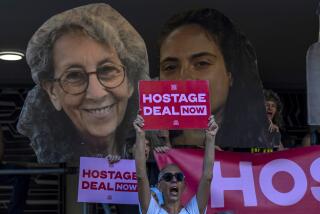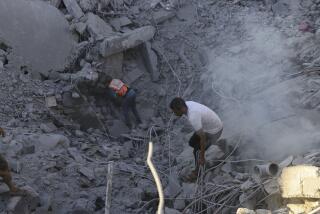Rabin, Arafat Clash; Talks Deadlocked : Diplomacy: Each side accuses the other of periling the peace accord. They’ll meet next week.
JERUSALEM — An angry meeting between Israeli Prime Minister Yitzhak Rabin and PLO Chairman Yasser Arafat on Thursday deepened the sense of crisis in Israeli-Palestinian relations, with each side accusing the other of endangering their peace agreement.
The two leaders agreed to meet again in one week to try to break a deadlock over how to move negotiations forward.
During more than two hours of talks Thursday, Rabin listed steps Arafat must take before Israel will continue talks on extending Palestinian self-rule throughout the West Bank and redeploying Israeli troops out of West Bank towns and villages.
Rabin demanded that Arafat disarm Palestinian factions in the Gaza Strip that have vowed to destroy the Israeli-Palestinian peace framework. He also demanded that those involved in attacks on Israelis be arrested and brought to trial.
“From our point of view, the main and dominant consideration is the security of the residents of Israel and the Israelis in Judea, Samaria and Gaza,” Rabin told reporters after the session, using the biblical terms “Judea” and “Samaria” for the West Bank. “From their point of view, it’s, of course, what seems to them to be lack of progress in the negotiations. The disagreements revolve mainly around the different emphases for practical action.”
Rabin refused Arafat’s demand that he lift Israel’s Jan. 22 closure of the West Bank and Gaza Strip, imposed after two Palestinian suicide bombers killed 21 Israelis in an attack on a bus stop in northern Israel. Rabin said the closure is necessary to protect Israelis.
“We have specific, concrete intelligence information on major terrorist attacks planned in the next few days to commemorate a year since the massacre at the Cave of the Patriarchs,” Environment Minister Yossi Sarid told Israel Television after the Rabin-Arafat meeting.
*
Sarid was referring to the anniversary next Tuesday--according to the Islamic calendar--of the morning that Baruch Goldstein, a Jewish settler, opened fire in the Ibrahim mosque, inside Hebron’s Cave of the Patriarchs, a site holy to both Jews and Muslims. Goldstein shot dead about 30 Palestinians before he was beaten to death by enraged worshipers.
Arafat reportedly told Rabin that the Palestinians had foiled a planned suicide attack by apprehending the would-be attacker in Gaza on Wednesday. But Rabin said he must do more.
For the first time since the two leaders began meeting periodically at the Gaza Strip’s Erez checkpoint to work out problems, they did not hold a joint news conference. Arafat reportedly was infuriated by Rabin’s refusal to release Palestinian prisoners or lift the border closure.
The border closure has had a profound economic impact, particularly in Gaza, which was heavily dependent on the wages that about 21,000 workers were earning inside Israel in December.
Arafat’s aides argue that the extended closure, and the lack of progress in negotiations on other issues, is eroding Palestinian support for the peace accord and fueling extremist organizations.
And a poll published Thursday by the Center for Palestine Research and Studies, a think tank based in the West Bank city of Nablus, also indicated that Palestinian support for the peace accord is vanishing.
Israel has temporarily closed the territories many times, but the January attack transformed closure from a short-term security measure to a policy goal.
Reflecting public disillusionment with the peace accord Israel and the Palestine Liberation Organization signed Sept. 13, 1993, Rabin has formed ministerial committees to study ways to permanently separate Israel from the West Bank and Gaza Strip.
For Israelis, separation means eliminating the need for Palestinian workers inside Israel. It also means building fences along parts of the imaginary line that divides pre-1967 Israel from the West Bank, and increasing police patrols along that line to keep Palestinians from illegally crossing into Israel.
But it does not mean evacuating the 140,000 Jews now living in more than 100 settlements scattered across the West Bank.
Arafat has said that he would welcome a “political” separation, if that means the establishment of a Palestinian state in the West Bank and Gaza with Jerusalem as its capital. But he has rejected the notion of separation for Israeli security reasons only.
More to Read
Sign up for Essential California
The most important California stories and recommendations in your inbox every morning.
You may occasionally receive promotional content from the Los Angeles Times.










